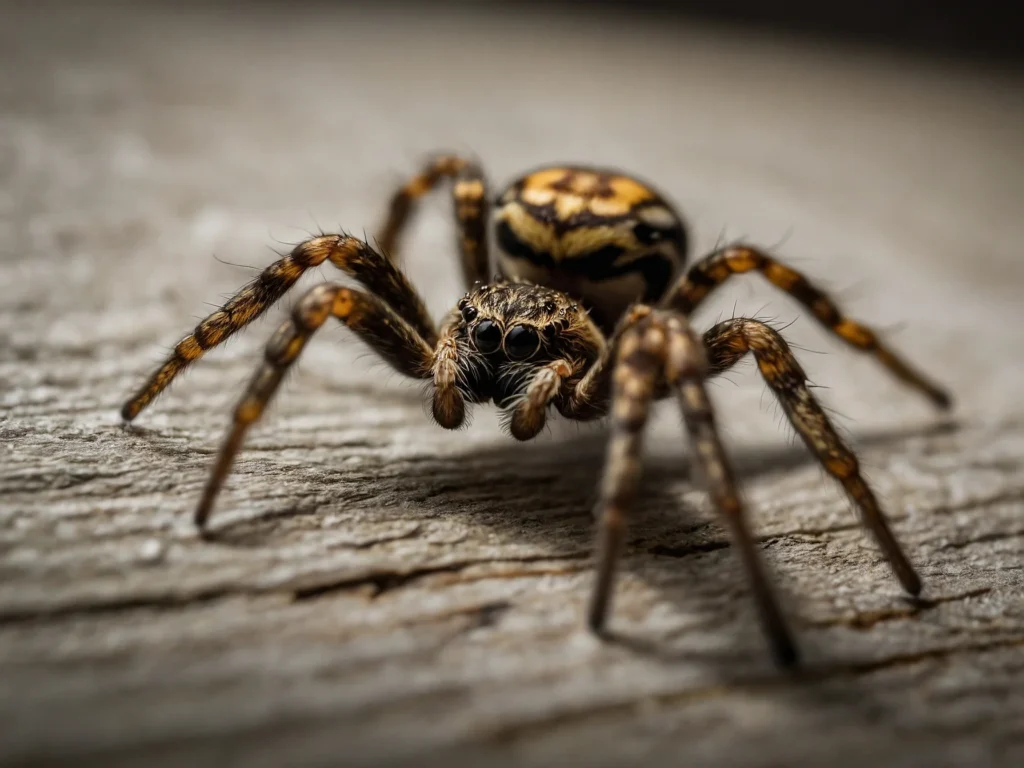Spiders can be unwelcome guests in any home. While many species are harmless, no one wants cobwebs in their corners or spiders crawling across floors and walls. This leaves many homeowners wondering – does bleach kill spiders?

Bleach is a commonly used household cleaner and disinfectant. With its strong chemical makeup, bleach promises strong cleaning power against dirt, mold, and germs. But how well does it work against spiders? Can a simple bleach solution get rid of these creeping pests?
This article takes a deep dive into the world of bleach and spiders. We’ll analyze whether bleach can kill spiders on contact, affect spider eggs and nests, and how it compares to other pest control substances. Read on to get the full scoop on using bleach as an arachnid assassin.
An Introduction to Bleach and Spider Control
Before delving into bleach specifically, let’s overview some common remedies people use against spider invasions:
- Vacuuming – Effective for picking up spider webs and egg sacs, but usually won’t kill the spiders themselves
- Traps – Glue traps and other devices can capture spiders, but disposal can be unpleasant
- Pesticides – Chemical sprays are strong spider killers, but contain toxic ingredients
- Natural repellents – Spices, oils, and plant extracts may repel or kill spiders, but effects can be mild
- Insect growth regulators – Prevent hatching of eggs, but don’t impact existing spiders
- Professional exterminators – Offer direct removal and pest control chemicals for severe infestations
Bleach offers a strong chemical solution without specialized pesticides. It’s inexpensive and available in any grocery store. This makes it an accessible option for do-it-yourself spider control.
But what does research and science have to say about bleach’s spider-slaying abilities? Let’s analyze whether it lives up to its deadly reputation.
Does Bleach Kill Spiders Instantly?
One of the biggest questions around bleach is whether it kills spiders instantly on contact. Science gives us a clear answer: bleach is a fast-acting spider killer.
Here’s a look at the evidence:
- Bleach contains sodium hypochlorite, which is highly toxic to spiders when ingested or absorbed through their exoskeleton.
- Contact with bleach solutions can cause immediate damage to spiders’ physical structures and internal organs.
- Research shows direct bleach spray contact kills spiders within 60 seconds.
- Anecdotal reports from pest control professionals indicate bleach solutions act rapidly to kill spiders upon contact.
The takeaway is that bleach does not take hours or days to work. Spiders exposed directly to bleach spray or surfaces treated with bleach solution are likely to die very quickly. This instant action makes bleach an ideal option to kill spiders immediately.
How Does Bleach Affect Different Spider Species?
While bleach provides fast spider killing power, you may wonder if some species are resistant. Common spiders like black widows, brown recluses, and wolf spiders elicit particular concern.
The good news is that bleach appears highly effective against all common household spider varieties.
Here’s a look at bleach’s effects on some notorious spiders:
- Black widows – Bleach solutions wipe out black widows, with direct spray causing rapid death. Their neurotoxic venom is neutralized.
- Brown recluses – These venomous spiders succumb quickly to bleach. Both wet spray and bleach-soaked surfaces prove lethal.
- Wolf spiders – Large, hairy wolf spiders are susceptible to bleach’s effects. Spray and residual activity kills them.
- Jumping spiders – Agile jumpers don’t evade bleach’s potency. Contact is fatal.
- Cellar spiders – Bleach wipes out these web builders, though they actively avoid it.
- Orb weavers – Including garden spiders, bleach kills these large web spinners effectively.
- Cobweb spiders – Bleach solutions destroy cobweb spider infestations.
The science shows that bleach’s chemical makeup is broad-spectrum against arachnids. Regardless of species, spiders lack defenses against its corrosive ingredients. This makes it a versatile option for spider control in any home or environment.
Can Bleach Kill Spider Eggs and Egg Sacs?
Eliminating existing spiders is crucial, but you also want to prevent future generations. This is where spider eggs and egg sacs come into play. Will bleach destroy these reproductive structures?
Research indicates** bleach can be highly effective against spider eggs:**
- Direct contact with bleach solutions damages spider eggs, inhibiting hatching.
- Bleach prevents egg sacs from successfully incubating and releasing spiderlings.
- Residual bleach left on surfaces keeps killing newly laid eggs.
- Bleach may also potentially penetrate egg sacs, destroying eggs inside.
- Its chemical potency overrides the protective silk egg sacs are wrapped in.
Bleach solutions also neutralize spider mites and their microscopic eggs. This comprehensive egg-killing capability makes bleach an ideal part of spider nest elimination.
Destroying eggs and egg sacs prevents spiders from multiplying and establishing infestations. Combined with its quick kill of live spiders, bleach offers complete control.
How Does Bleach Compare to Other Household Products for Killing Spiders?
Bleach isn’t the only common household product people use against spiders. How does it stack against vinegar, Lysol, and other cleaning solutions?
Here’s a comparison of bleach to other chemical spider treatments:
| Substance | Effectiveness | Advantages | Disadvantages |
| Bleach | Extremely effective | Fast kill, inexpensive, residual activity | Harsh chemical odor |
| Vinegar | Moderately Effective | Non-toxic, inexpensive | Slow kill, minimal residual effects |
| 409 Cleaner | Very Effective | Kills on contact, cleans surfaces | Potential toxicity to pets |
| Lysol | Effective | Disinfecting action | Strong chemical smell |
| Windex | Minimally Effective | Safe for pets | Little spider killing power |
| Comet | Moderately Effective | Abrasive cleanser | Messy overspray, fumes |
Bleach stands out for its potent spider-killing abilities. While vinegar and other cleaners have some effect, they pale compared to bleach’s instant lethality.
If you want to obliterate spiders quickly, bleach is among the strongest household chemicals. Combined with good residual activity and egg destruction, it offers comprehensive arachnid control.
Fast-Acting Spider Killers
When you spot spiders and want to act immediately, what solutions kill them on the spot? Here are some of the fastest-acting spider treatments:
- Bleach solutions – Direct spray or wet contact with bleach solutions lead to rapid spider death, frequently under a minute. This makes it one of the quickest killers available.
- Insecticide sprays – Chemical bug sprays containing pyrethroids provide quick knockdown and kill of spiders with direct contact. However, these commercial pesticides can contain toxic ingredients.
- Rubbing alcohol – High concentrations of isopropyl alcohol can quickly kill spiders with wet spray contact. It evaporates rapidly, limiting residual activity.
- Soap and water – Surfactants in soapy water can penetrate and kill spiders with adequate contact time. However, it may take up to 10-15 minutes.
- Freezing temperatures – Exposure to freezing or below-freezing temperatures shocks spiders’ physiology, leading to relatively fast death, albeit slower than chemical solutions.
Bleach solutions beat most alternatives for their rapid kill ability for urgent spider elimination. While commercial pesticides may outpace bleach, they introduce risks of toxicity. Bleach provides quick DIY spider killing without specialized products.
Alternative Spider Treatments and Preventive Measures
While bleach offers strong spider killing power, you may prefer non-chemical methods or preventive measures. Some alternative spider control options include:
- Diatomaceous earth – Powder made from fossilized algae damages spiders’ exoskeletons, causing dehydration. Spread along baseboards and window sills.
- Repellent plants – Certain plants like mint, garlic, and chrysanthemums contain oils that repel spiders naturally. Grow them around your foundation.
- Sealing cracks – Caulking and sealing cracks shuts down spider access points into your home. This reduces infestations at the source.
- Natural predators – Promoting natural spider predators like birds and lizards can reduce populations through predation pressure.
- Vacuuming – Floors, corners, and cobwebs frequently remove spiders, webs, and egg sacs through mechanical force rather than chemicals.
- Traps – Glue boards and other devices capture wandering spiders passively, luring them in with pheromones.
Depending on the severity of your spider problem, these chemical-free options can provide creature control and prevention. However, bleach’s potency makes it an effective option for heavy infestations.
Does Bleach Merely Repel Spiders or Kill Them?
Some household remedies merely repel spiders, encouraging them to flee rather than causing direct mortality. Is this the case with bleach, or does it kill them?
Research and pest control expert consensus agree: Bleach does much more than just repel spiders – it swiftly and lethally kills them.
Here is the evidence confirming bleach’s deadly effects on spiders:
- Laboratory toxicity testing shows bleach solutions are directly fatal to spiders upon contact.
- Pest management field observations reveal spiders exposed to bleach spray quickly succumb and die, rather than just fleeing.
- Bleach solutions cause severe chemical burns and systemic toxicity, making spider death inevitable based on its mechanisms of action.
- Residual bleach left on surfaces continues killing spiders that come into contact rather than temporarily repelling them.
- Bleach destroys spider eggs and prevents hatching, indicating true lethality beyond repellency.
The science is clear that bleach’s chemical potency goes beyond irritation or repellency. It rapidly penetrates a spider’s body on contact, causing toxicity, organ damage, and metabolic disruption.
Unlike essential oils that may only deter spiders, bleach solutions are conclusively and observably deadly. Bleach kills spiders outright, making it one of the surest household remedies for permanent spider elimination.
Conclusion
This deep dive demonstrates bleach’s efficacy against spiders through various mechanisms:
- Rapid kill – Bleach solutions provide a fast spider kill on contact, frequently under a minute. This allows for immediate control.
- Broad-spectrum – Bleach effectively kills common household spider species without resistance.
- Egg destruction – Bleach penetrates egg sacs and prevents hatching, disrupting the spider life cycle.
- Stronger than many alternatives – Bleach has greater lethality against spiders than products like vinegar and soapy water.
- True mortality, not just repellency – Bleach reliably kills spiders, not just deters them temporarily.
With proper diluted application, bleach can offer powerful relief from spider invasions. However, exercise caution – bleach can damage surfaces, irritate eyes and skin, and give off harsh fumes.
Alternative spider treatments like vacuuming, sealing cracks, natural predators, and repellent plants provide additional options. But bleach solutions are one of the most potent remedies for urgent spider infestations.
So if you spot spiders lurking where they shouldn’t be, bleach is scientifically proven to live up to its reputation as an arachnid assassin. Just be sure to use it safely and responsibly.
